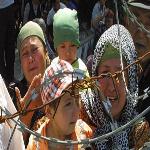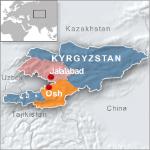17 June 2010

Photo: AP
Uzbek refugees seen near the eastern Uzbek city of Andijon while waiting to cross the border into Uzbekistan, 14 Jun 2010
Many ethnic Uzbeks in the southern Kyrgyzstan city of Osh, the scene of the heaviest violence, are reported to have barricaded themselves for fear of fresh attacks by their ethnic Kyrgyz neighbors.
Real blame
But who is to blame for the ethnic clashes?
The origins are murky, but reports point to a fist fight between some Kyrgyz and Uzbeks. The U.N. High Commissioner for Human Rights says the clashes appear to have been well-organized, fueling suspicions about the possible role of former President Kurmanbek Bakiyev, who was toppled in April and is now living in Belarus. He has denied involvement.
But Lauren Goodrich, senior Eurasia analyst at the private intelligence firm STRATFOR, says the real blame goes to the late Soviet dictator Josef Stalin.
"The ethnic tension became especially fierce after 1924," said Goodrich. "That's when Stalin drew the lines and divided up the most important territory in all of Central Asia [Kyrgyzstan, Tajikistan, Uzbekistan] between three different ethnic groups. That was unheard of. And it was a formula that Stalin had created just to create ethnic tension in order to prevent any one power from ever rising in Central Asia."
But Thomas Wood, a Eurasia specialist at the University of South Carolina at Aiken, says that although there have been ethnic tensions among groups, they largely have been dormant. He points out that until recently, relations have been relatively calm between native Kyrgyz and ethnic Uzbeks. But Wood says that years of corruption, government mismanagement and economic upheaval contributed to the outbreak of interethnic violence.
"At the top of my list would be weakening state capacity, an interim government that is in control of institutions that have been hollowed out, decades of governance in which political elites have basically stolen everything that wasn't bolted down," he said. "And all of this has just snowballed. And so I think we have to be cautious of the interethnic hatred explanation, very cautious, because we've had 20 years - by and large, not perfect - but 20 years of reasonable stability."

Regional crisis
But ethnic Uzbeks who live in Kyrgyzstan were the target of the latest violence. And that, says Lauren Goodrich, turned ethnic clashes into a regional crisis as neighboring Uzbekistan moved troops to the border.
"After Uzbekistan began to move troops, Kyrgyzstan, or the Kyrgyz government, the interim government, became increasingly worried that Uzbekistan was about to invade," she said. "I mean, when you see a few thousand Uzbek troops, who are very well trained, move to the border in the southern region where there is not a lot of Kyrgyz military, I would be worried too."
"And that's when Kyrgyzstan started calling on Russia to get involved. And then Uzbekistan thought, 'Okay, this was all set up by Russia in order to combat Uzbekistan.' So it's pretty much a war of paranoias, almost, that's going on between Kyrgyzstan and Uzbekistan," she added.
The Soviet Union sent troops to quell the last major outbreak of interethnic unrest in 1990. But Russia has been reluctant to dispatch troops unilaterally or through the Collective Security Treaty Organization - a grouping of former Soviet states - in response to the current situation.
Sentiment against neighbors
Thomas Wood says Uzbekistan has exploited sentiment against its regional neighbors since it became independent in 1991.
"It has gone down the road of a form of ultranationalism where important to this nationalism was secure borders and border fences," he said. "And the regime tended to play up the idea of disorder and threats on the other side of the border that therefore reinforced their own legitimacy and right to rule."
The Kyrgyz interim government, which most analysts note is weak, is expected to hold a constitutional referendum on June 27, with parliamentary elections to be held sometime thereafter. The government insists this month's vote will be held as scheduled. But many analysts are skeptical that a shaky interim government will be able to organize a credible referendum in such a tense climate.